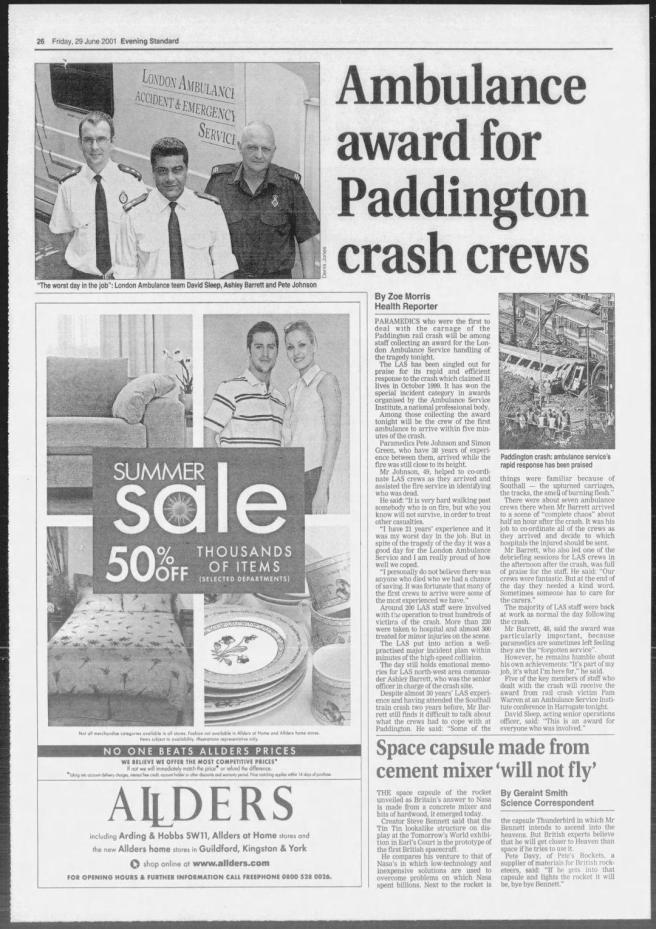“‘Bye Pete”
Last Friday night I was sleeping soundly when I was woken by a vivid dream in the early hours of Saturday morning. The dream had taken me back to an event in the 1980s that I had never written about on this blog before. On Saturday afternoon, I was having a coffee with my friend Roland in a Farm Shop in Suffolk, and I told him the story. After telling him, I decided to put it on my blog this week, in the hope that publishing it will get it out of my mind and onto the page.
In the mid 1980s, psychatric patients were being discharged from hospitals all over Britain and offered ‘Care In The Community’ instead. This was supposed to be a progressive step, though in reality it was so the government could sell off all the old Mental Hospitals and the land they occupied. It turned out to be a disaster.
One afternoon, we received an emergency call given as ‘Person sitting on a ledge’. Arriving at a large housing estate in West London, we were directed by the caller to a 22-floor tower block nearby. He told us, “There’s a woman sitting on the ledge at the top, she looks young”. Sure enough, we could see someone on the roof, her legs dangling over the side. Taking the lift to the top floor, we saw that the roof access had been left unlocked. There was some work being done on some windows in the building, and it was likely the contractors had forgotten to replace the padlock.
Allowing for the ground floor reception area, I estimated we were 230 feet above the street by the time we got to the roof.
We walked out onto the tarmac-covered roof, and I could see the back of a woman sitting on top of a parapet that was around three feet high. The view across to other districts of West London was amazing, especially as the sun was going down. On the street below, we could hear the sirens from police cars that were also attending. I walked a few paces and called out to the woman, asking her if she was okay, and could we help her.
She turned and looked at me, smiled, and shook her head. I called out “Is it alright if I come and talk to you?” She replied, “Just one of you, no more, or I will jump. And don’t try to grab me”. I asked my colleague to step back inside the stairwell, and to tell the police officers not to come out onto the roof. Then I walked across and sat down near her, with my back against the ledge. She told me to stretch out my arm, to reassure her that I was too far away to easily reach her.
I told her my name was Pete, and I wanted to help her. She didn’t tell me her name, but eventually told me she was twenty-six years old and had previously been in a psychiatric hospital from the age of eighteen. Being ‘released’ into the community had definitely not worked for her, as I heard.
“I was happy in hospital. I had friends there, I had my life there, I was in there because I couldn’t cope outside, and they knew that. Then they tell me I can cope alone, and stick me in a flat in this block. I don’t know anyone, I don’t know how to pay a bill, don’t know how to buy food, use a bank, don’t know anything. The social worker is supposed to help, but they are too busy to spend much time with us, so just give out leaflets. I can’t see the point, this is no life”.
Of course, I said all the right things. That we would get her more help, that this incident would alert the social services to do more, and that she was young enough to learn how to live outside hospital and eventually make friends. They were hollow words though, as experience had already taught me none of that was going to be easy.
So we sat there, her looking at the lovely sunset over London, me waiting hopefully that she would calm down and eventually come back inside the building with me. After a while, perhaps another fifteen minutes, she turned and looked at me. “What was your name again?” I told her it was Pete. She nodded, and looked back at the view. I heard her say “‘Bye Pete” and then she just slipped off the ledge into the void.
With my head in my hands, I knew I would never look over the ledge at the scene below. Fortunately, another ambulance crew had been sent as backup, and they removed the woman’s body to the local mortuary. I gave a short statement to a police officer, then we went back to our ambulance to complete the necessary paperwork.
Ten minutes after that, we received another emergency call over the radio.

